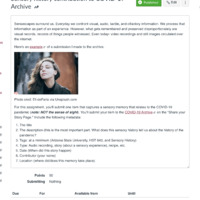Item
Don't Forget Your Mask!
Title (Dublin Core)
Don't Forget Your Mask!
Disclaimer (Dublin Core)
DISCLAIMER: This item may have been submitted in response to a school assignment prompt. See Linked Data.
Description (Dublin Core)
The mask has had a huge impact on our sense of touch and smell. For one, breathing with a mask on was an adjustment. Tuna sandwiches became something to avoid at all costs because of the smell you could be stuck with all day by wearing a mask. There is also something to say about the feeling of a mask around your ears and over your nose. The constant practice of grabbing a mask and putting it around one's ears has become a ritual of protection or habit as we are now bound to this object like that of a cell phone which is now always on our person. The sense of touch also adapted to various kinds of masks that were promoted and the variety of masks that would be marketed for commercial value. The mask, one of the few things that forces us to run back inside the house because we forgot it. The mask, a true measuring stick for how quick we can adapt and change society for better and for worse.
Date (Dublin Core)
October 18, 2021
Creator (Dublin Core)
Mary Altaffer
Roxanne Scott
Contributor (Dublin Core)
Andres Gonzalez
Event Identifier (Dublin Core)
HST643
Partner (Dublin Core)
Arizona State University
Type (Dublin Core)
Website
Link (Bibliographic Ontology)
Controlled Vocabulary (Dublin Core)
English
Government State
English
Government Local
English
Public Health & Hospitals
English
Social Distance
English
Politics
Curator's Tags (Omeka Classic)
Tempe
government
policy
mask policy
controversy
public health
symbol
Contributor's Tags (a true folksonomy) (Friend of a Friend)
Arizona State University
HST643
sensory history
limited
survival
necessary
new normal
mask
Linked Data (Dublin Core)
Date Submitted (Dublin Core)
10/18/2021
Date Modified (Dublin Core)
10/21/2021
06/27/2023
Date Created (Dublin Core)
07/01/2020
Item sets
This item was submitted on October 18, 2021 by Andres Gonzalez using the form “Share Your Story” on the site “A Journal of the Plague Year”: http://covid-19archive.org/s/archive
Click here to view the collected data.

